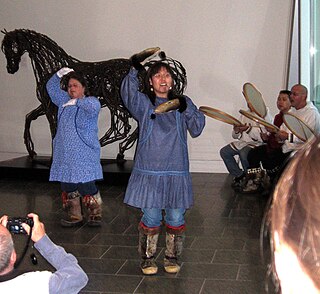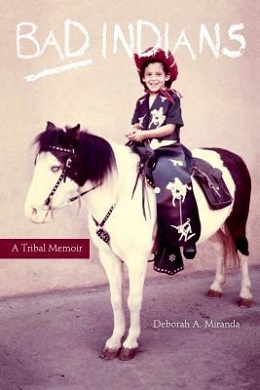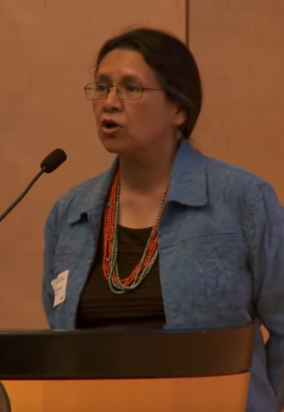Related Research Articles

The Indian Removal Act of 1830 was signed into law on May 28, 1830, by United States President Andrew Jackson. The law, as described by Congress, provided "for an exchange of lands with the Indians residing in any of the states or territories, and for their removal east of the river Mississippi". During the presidency of Jackson (1829–1837) and his successor Martin Van Buren (1837–1841) more than 60,000 Native Americans from at least 18 tribes were forced to move west of the Mississippi River where they were allocated new lands. The southern tribes were resettled mostly in Indian Territory (Oklahoma). The northern tribes were resettled initially in Kansas. With a few exceptions, the United States east of the Mississippi and south of the Great Lakes was emptied of its Native American population. The movement westward of indigenous tribes was characterized by a large number of deaths occasioned by the hardships of the journey.

Gerald Robert Vizenor is an American writer and scholar, and an enrolled member of the Minnesota Chippewa Tribe, White Earth Reservation. Vizenor also taught for many years at the University of California, Berkeley, where he was Director of Native American Studies. With more than 30 books published, Vizenor is Professor Emeritus at the University of California, Berkeley, and Professor of American Studies at the University of New Mexico.
Cultural appropriation is the adoption of an element or elements of one culture or identity by members of another culture or identity in a manner perceived as inappropriate or unacknowledged. This can be especially controversial when members of a dominant culture appropriate from minority cultures. When cultural elements are copied from a minority culture by members of a dominant culture, and these elements are used outside of their original cultural context – sometimes even against the expressly stated wishes of members of the originating culture – the practice is often received negatively. Cultural appropriation can include the exploitation of another culture's religious and cultural traditions, customs, dance steps, fashion, symbols, language, history and music.

War bonnets are feathered headgear traditionally worn by male leaders of the American Plains Indians Nations who have earned a place of great respect in their tribe. Originally they were sometimes worn into battle, but they are now primarily used for ceremonial occasions. In the Native American and First Nations communities that traditionally have these items of regalia, they are seen as items of great spiritual and political importance, only to be worn by those who have earned the right and honour through formal recognition by their people.

Stereotypes of Indigenous peoples of Canada and the United States of America include many ethnic stereotypes found worldwide which include historical misrepresentations and the oversimplification of hundreds of Indigenous cultures. Negative stereotypes are associated with prejudice and discrimination that continue to affect the lives of Indigenous peoples.
Elizabeth Cook-Lynn was a Native American editor, essayist, poet, and novelist. She was considered to be outspoken in her views about Native American politics, particularly in regards to tribal sovereignty.

The Yana are a group of Native Americans indigenous to Northern California in the central Sierra Nevada, on the western side of the range. Their lands, prior to encroachment by white settlers, bordered the Pit and Feather rivers. They were nearly destroyed during the California genocide in the latter half of the 19th century. Descendants of the Central and Southern Yana continue to live in California as members of Redding Rancheria.
Jean Maria O'Brien is an American historian of White Earth Band of Ojibwe ancestry who specializes in northeastern Woodlands American Indian history.
George E. "Tink" Tinker is an American Indian scholar of the Osage Nation who taught for more than three decades at the Iliff School of Theology, a United Methodist Church theological school, where he focused his scholarship on the decolonization of American Indian Peoples. The Tinker family name is deeply embedded among the Osage.
José Barreiro is an American novelist, journalist and activist. He is recognized as an advocate of Native community self-determination and autochthonous development (indigeneity). Barreiro is an elder and advisor in the Nación Taina.

Native American identity in the United States is a community identity, determined by the tribal nation the individual or group belongs to. While it is common for non-Natives to consider it a racial or ethnic identity, for Native Americans in the United States it is considered a political identity, based on citizenship and immediate family relationships. As culture can vary widely between the 574 extant federally recognized tribes in the United States, the idea of a single unified "Native American" racial identity is a European construct that does not have an equivalent in tribal thought.

Indigenous peoples of California, commonly known as Indigenous Californians or Native Californians, are a diverse group of nations and peoples that are indigenous to the geographic area within the current boundaries of California before and after European colonization. There are currently 109 federally recognized tribes in the state and over forty self-identified tribes or tribal bands that have applied for federal recognition. California has the second-largest Native American population in the United States.
Native American literature is literature, both oral and written, produced by Native Americans in what is now the United States, from pre-Columbian times through to today. Famous authors include N. Scott Momaday, Leslie Marmon Silko, Simon Ortiz, Louise Erdrich, Gerald Vizenor, Joy Harjo, Sherman Alexie, D'Arcy McNickle, James Welch, Charles Eastman, Mourning Dove, Zitkala-Sa, John Rollin Ridge, Lynn Riggs, Hanay Geiogamah, William Apess, Samson Occom, and Stephen Graham Jones. Importantly, it is not "a" literature, but a set of literatures, since every tribe has its own cultural traditions. Since the 1960s, it has also become a significant field of literary studies, with academic journals, departments, and conferences devoted to the subject.
Indigenous American philosophy is the philosophy of the Indigenous peoples of the Americas. An Indigenous philosopher is an Indigenous American person who practices philosophy and draws upon the history, culture, language, and traditions of the Indigenous peoples of the Americas. Many different traditions of philosophy exist in the Americas, and have from Precolumbian times.

The Texas Band of Yaqui Indians is a cultural heritage organization for individuals who identify as descendants of Yaqui people, and are dedicated to cultural and ethnic awareness of the Yaqui. The organization is headquartered in Lubbock, Texas.

Bad Indians: A Tribal Memoir is a mixed-genre book by Deborah Miranda published by Heyday Books in 2013. The book is part tribal history of the California Mission Indians and part family memoir. It combines different media and genres including oral histories, newspaper clippings, anthropological recordings, poems, and personal reflection to narrate the stories of Miranda’s family, who were members of the Ohlone/Costanoan – Esselen Nation, along with the experiences of California Indigenous people from the time of the Spanish missions into the present.

An Indigenous Peoples' History of the United States is a non-fiction book written by the historian Roxanne Dunbar-Ortiz and published by Beacon Press. It is the third of a series of six ReVisioning books which reconstruct and reinterpret U.S. history from marginalized peoples' perspectives. On July 23, 2019, the same press published An Indigenous Peoples' History of the United States for Young People, an adaptation by Jean Mendoza and Debbie Reese of Dunbar-Ortiz's original volume.
Indigenous cultures in North America engage in storytelling about morality, origin, and education as a form of cultural maintenance, expression, and activism. Falling under the banner of oral tradition, it can take many different forms that serve to teach, remember, and engage Indigenous history and culture. Since the dawn of human history, oral stories have been used to understand the reasons behind human existence. Today, Indigenous storytelling is part of the broader indigenous process of building and transmitting indigenous knowledge.

Debbie Reese is a Nambé Pueblo scholar and educator. Reese founded American Indians in Children's Literature, which analyzes representations of Native and Indigenous peoples in children's literature. She co-edited a young adult adaptation of An Indigenous Peoples' History of the United States with Jean Mendoza in 2019.
References
- 1 2 Denson, Andrew (May 2016). "Why You Can't Teach United States History without American Indians ed. by Susan Sleeper-Smith et al. (review)". Journal of Southern History. 82 (1). doi:10.1353/soh.2016.0105 . Retrieved July 7, 2024.
- 1 2 Rensink, Brenden W. (2018). "Why You Can't Teach United States History without American Indians". Journal of the Native American and Indigenous Studies Association. 5 (1) – via Gale Academic OneFile.
- ↑ Svingen, Orian (2017). "Why You Can't Teach United States History without American Indians" (PDF). American Indian Culture and Research Journal. 41 (1). Retrieved July 7, 2024.